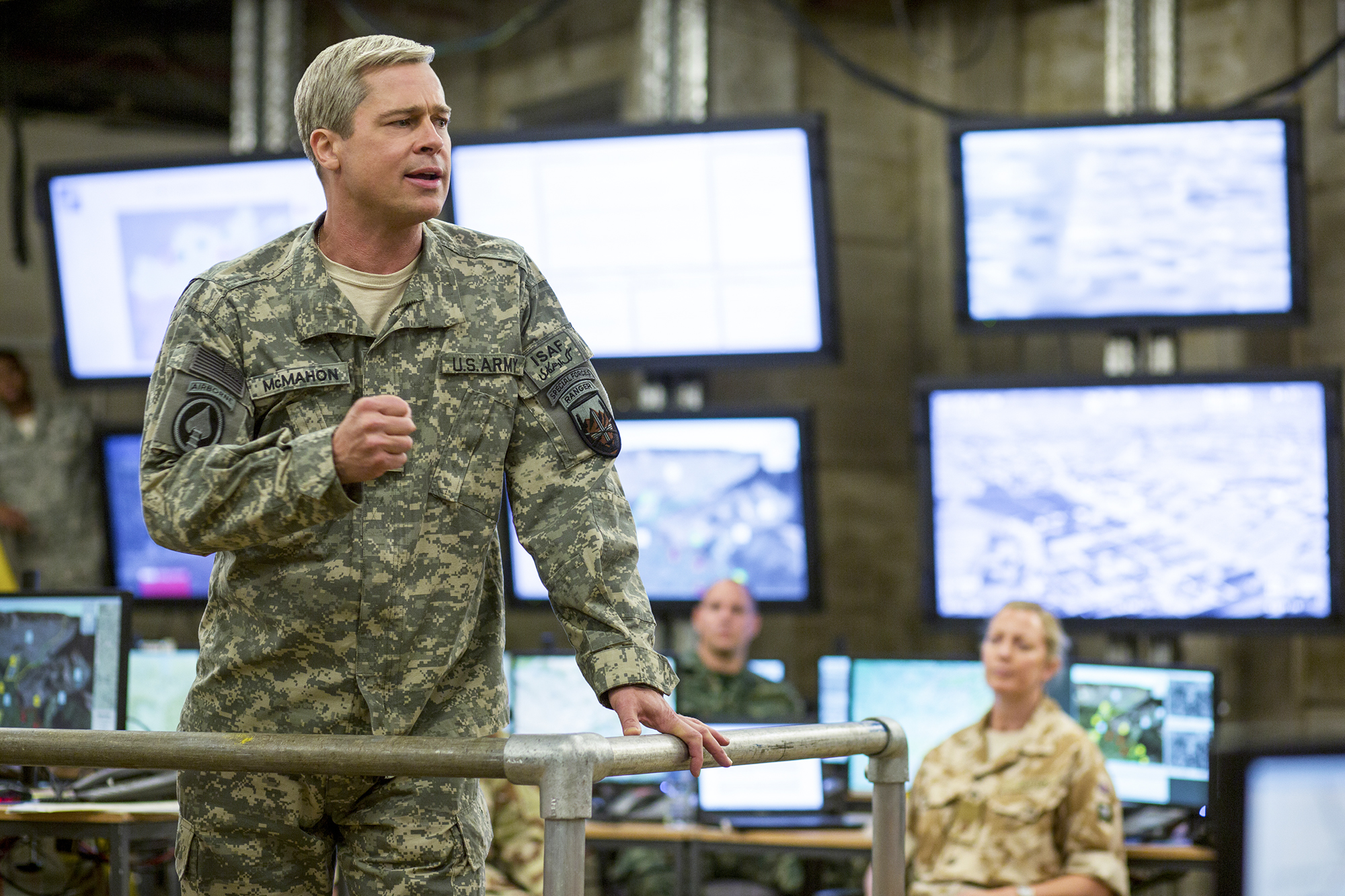It should not require a spoiler alert to reveal that War Machine, the new Netflix movie starring Brad Pitt as a general who has everything in common with Stanley A. McChrystal except his name, ends with the resignation of its protagonist — or antagonist, depending on your point of view. Written and directed by David Michôd, the film is based on the late journalist Michael Hastings’ 2012 book The Operators, which expands upon his provocative 2010 Polk Award-winning Rolling Stone profile of McChrystal, “The Runaway General.”
But what the movie speeds through in its denouement — the article’s publication, the resignation, the installation of a replacement — is just as fascinating as the events preceding it.
The movie starts at the beginning of the end of the War in Afghanistan, when General Glenn McMahon (a stand-in for McChrystal) is installed to handle a mess the Obama administration seems to believe might be cleaned up, if shoddily, but not won. But McMahon — who Pitt plays with a permanently furrowed brow that doesn’t quite convey the seriousness the general thinks it does — intends to win it anyway, using a strategy called SNORP (a stand-in for the real-life COIN), which aims to defeat the insurgency through nation-building.

Hastings’ profile of McChrystal, leaked in June 2010 and published in the following month’s issue of Rolling Stone, painted a picture of a general who was openly dissatisfied with — and in the view of many, insubordinate to — senior Obama administration figures. In the movie’s version of events, McMahon bows out of a Skype call with senior officials by feigning a poor connection and asking his IT assistant (RJ Cyler) to play along with the charade. He schedules an interview with 60 Minutes without permission, attempting to garner public support for his strategy despite its divergence from top-down orders.
In real life, as it was for McMahon in the film, the fallout for McChrystal was swift. The day after the story leaked, Obama summoned the general to the White House, where he offered his resignation. “The conduct represented in the recently published article does not meet the standard that should be set by a commanding general,” Obama explained to the public. “It undermines the civilian control of the military that is at the core of our democratic system.”
MORE Review: Brad Pitt Takes on the Runaway General in War Machine
Hastings, for his part, told Democracy Now that he had not anticipated quite so drastic a response to the story. “I figured it would maybe give General McChrystal and his team a headache for a couple days and then it would be swept under the rug and I’d lose my access and we’d go on and I’d write another story,” he said in a TV interview. “They would kind of think I’m a jerk and we’d go on from there.” He said the intent of the story was to use McChrystal as a lens through which to examine issues with the Afghanistan strategy in general.
But it was not just McChrystal who was microscopically scrutinized after the story was published. Hastings’ reporting was quickly called into question by several journalists, who were astonished that the general and his aides had been candid enough to risk their posts while on the record. It also prompted investigations of McChrystal’s actions by the U.S. Army and the Pentagon. The reports found no proof of wrongdoing on behalf of the general— though they did confirm “the general substance” of several incidents — but neither did they disprove the facts of the story.
A few days shy of three years after the story ran, Hastings, 33, was killed in a car accident in Los Angeles. Conspiracy theories quickly emerged, alleging that the accident might have been a cyber attack by U.S. intelligence agencies concerned with the potential impact of a damning story Hastings was working on. But his death was ruled an accident, with no evidence of foul play. Hastings’ widow Elise Jordan (a contributor to TIME), told Piers Morgan that although her husband was always working on several “hot stories” at once, she believed it had been an accident.
McChrystal would go on to teach at Yale, write a memoir and found a consultancy that applies the lessons of his military career to the business world. And now he gets what most young West Point cadets could only dream of — to be played, if by another name, by Brad Pitt in the movies.
More Must-Reads from TIME
- Cybersecurity Experts Are Sounding the Alarm on DOGE
- Meet the 2025 Women of the Year
- The Harsh Truth About Disability Inclusion
- Why Do More Young Adults Have Cancer?
- Colman Domingo Leads With Radical Love
- How to Get Better at Doing Things Alone
- Michelle Zauner Stares Down the Darkness
Write to Eliza Berman at eliza.berman@time.com